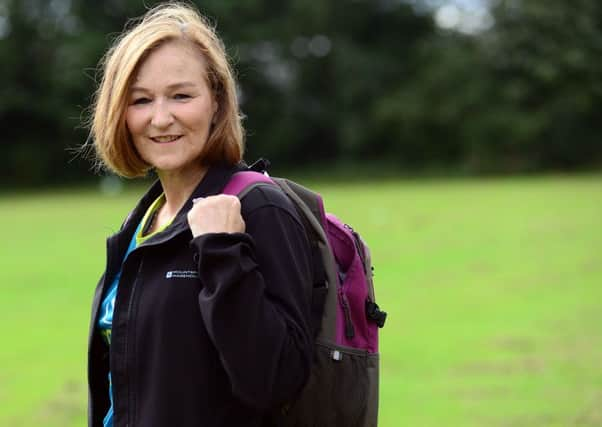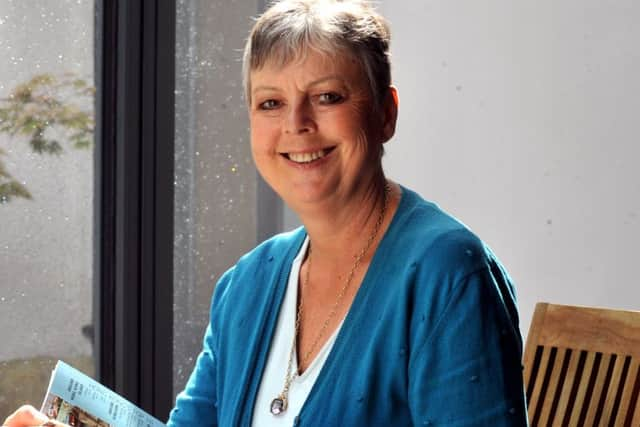'˜I spent a fortune after being told I was dying, then found out I wasn't'


WHEN Barbara Hibbert found out she was dying from cancer there was only one thing for it. She went shopping.
“I was Stage Four which isn’t very good news really,” she says, with a hefty dose of understatement. “They gave me a booklet and I thought, this is very well set out and well explained. Then I got to the bit relevant to me and I sort of went, oh.
Advertisement
Hide AdAdvertisement
Hide Ad“It basically told me I was going to die – and sooner rather than later. So I started spending lots of money.”


First on Barbara’s list was a new car. An Audi A3 “with lots of toys on it”. “I’d just had an A to B one before, but I thought ‘what the hell?’,” she shrugs.
“We were going to get a new kitchen anyway but we got a rather more high spec one than we’d intended. My clothes got an upgrade too, although I did need a new wardrobe anyway because I’d lost three stones.”
She and husband Ed are now on their way to Australia, flying business class, naturally. “But that’s largely because I don’t think my insides are up to economy any more,” Barbara, from Harrogate, adds quickly.
Advertisement
Hide AdAdvertisement
Hide AdThere’s only one slight snag to this spending spree. It turns out Barbara’s not dying after all.


“I think the booklet they gave me was out of date,” she says. “It took me a while to work out that actually because mine was operable I’d got at least a fighting chance.”
It’s just under a year since her treatment for bowel cancer ended. Major surgery included two abdominal operations and a bowel resection. There were also a couple of bouts of chemotherapy, just for good measure.
“Now I’m thinking I might survive longer term I’m going, ooh, did my new kitchen need to be quite so high spec and was there much wrong with my old car? It’s ok, but it’s just that sort of, yes, I was spending all this money but maybe it will have to last me a bit longer. But it’s the problem I’d rather have, obviously.”
Advertisement
Hide AdAdvertisement
Hide AdBarbara isn’t the only one having to rethink future plans. New research published this week shows people are twice as likely to live at least 10 years after being diagnosed with cancer than they were at the start of the 1970s.
Earlier detection and more sophisticated treatment are key factors behind this hefty increase, although Macmillan Cancer Support, which published the data, warned that one of the consequences was increasing demand on the NHS.
“More and more people are being diagnosed with cancer and, in general, having a more sophisticated life with their cancer than perhaps they would have done,” said the charity’s chief executive, Lynda Thomas. “What we are now seeing is that lot of people are coming in and out of treatment, so all of that does put pressure on the NHS.”
There is also an impact on those cancer survivors who, while grateful to be alive, have no idea if or when the disease might come back. In many cases, it leads to a root and branch re-evaluation of their life. It certainly has for Barbara – and not just over her spending habits.
Advertisement
Hide AdAdvertisement
Hide Ad“It definitely changes your mindset,” she says. “You come to grips with your own mortality. You don’t have a lot of choice. You either take to your sofa and feel sorry for yourself or you just get on with it.
“But you’re much more appreciative of the little things. You see the blossom on the trees and wonder if you’ll see it again next year.
“Now I’ve got to the stage where I’m starting to think further ahead than a few months or a year, then I think, oh, perhaps I shouldn’t do.
“When I thought that I hadn’t got very long I figured, well, we all end up in the same place eventually. It might have been sooner than I’d have liked or expected but I never thought, why me or that it was unfair.
Advertisement
Hide AdAdvertisement
Hide Ad“I am much more appreciative of things and the choices I’ve got,” says the 58-year-old former teacher turned education consultant.
“My first grandchild is due to arrive in November. But even now I think, well, I don’t know how long I’ll see this grandchild for. Will I see her graduate from university? Will I see her start school? I think I’m fairly confident I’ll see her born, but I’m not taking much more for granted because I know my cancer could recur.”
For the moment, she is still making the most of her improved prognosis. After every all-clear at her six-monthly check-ups, she books a holiday. “That’s my plan,” she says, “although they may need to get cheaper the longer I survive. I might need to get less extravagant.
Karen McLean was diagnosed with breast cancer at the age of 50 following a routine mammogram in 2013. She ended up having a double mastectomy.
Advertisement
Hide AdAdvertisement
Hide Ad“I wasn’t devastated, more completely shocked,” she says now. “I had no clue. I had lost a lot of weight but I just thought it was because I was dieting.”
Two years on, however, she feels better than she has done in years. “I really do. I’ve changed everything. I have a different diet and drink lots of water, which I never did before.
“I do a fitness boot camp two or three times a week and recently did the Three Peaks Challenge for Yorkshire Cancer Research. Now I’m signed up to do Mount Kilimanjiro next February.”
Having been a decent swimmer as a youngster, the only real exercise she had was taking her dog for a walk round the block or the local park.
Advertisement
Hide AdAdvertisement
Hide AdCancer brought a complete change. She now walks between 10 and 16 miles every weekend and recently walked up Scafell Pike, England’s highest mountain, as part of her training for Kilimanjiro. Ben Nevis is now next on her list and the Coast to Coast Walk from Cumbria to Robin Hood’s Bay is also in her sights.
“I never thought I could do anything like this,” says the 52-year-old, who has recently moved from Scarborough to Leeds with her 15-year-old son Corey.
“I’d let myself go really and just trudged through life. “Now I make every day count. I just want people to that there is life after cancer. Yes, it’s a difficult time, a devastating time, but you can come through it and as strange as it might sound, it’s actually been a force for good in my life.
“I know it’s a bit extreme to change your life like that but sometimes you need a kickstart. Cancer gave me mine and now I love the outdoors and go out walking whenever I can.
Advertisement
Hide AdAdvertisement
Hide Ad“But at the same time I’m keen to do whatever I can not only to raise much-needed funds for Yorkshire Cancer Research but also raise awareness. It’s important to me. It’s a massive thing in my life.”
Karen must undergo annual check-ups to make sure her cancer hasn’t returned but is phlegmatic about the thought of a recurrence.
“when I went last year he said I had a 90 per cent chance of reaching 60. At the time I thought, that isn’t actually that far away but I don’t dwell on it any more.
“If you think about it too much you would drive yourself mad. You’ve just got to live every day and grab it. That’s the only way to be really.”